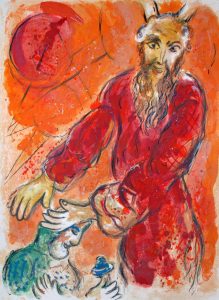Not Wanting to Leave: Staying in the Tent
Lectionary Reading 1: Ex 33:7-11; 34: 5B-9, 28
In the first reading for today from Exodus, we read of the time Moses spent in “the meeting tent,” outside his camp. When Moses entered the tent “a cloud of smoke would come down and stand at the entrance of the tent” while the Lord and Moses spoke. “The Lord would speak to Moses face to face, as one man speaks to another. Then Moses would return to the camp, but his young assistant, Joshua, son of Nun, would not move out of the tent.” (Ex 33:11) The reading continues on for quite some time with the famous description of the Lord “slow to anger and rich in kindness,” and ends with Moses writing the ten commandments on the tablets.
It is amazing how one simple line in scripture can often pack such a punch, such as this example: “Joshua, son of Nun, would not move out of the tent.” This line jumps off the page at me and stays with me long after my eyes have continued reading the rest of Exodus. First of all, it’s a very brief and subtle but important mention of the fact that Joshua was present when the Lord would speak to Moses, which helps explain why he is chosen as successor to Moses. But even more important, Joshua would not move out of the tent even when Moses left. This action is layered with significance. After all, it was Joshua who completed Moses’s mission to lead the Israelites to the Promised Land. But most importantly, Joshua displays a beautiful devotion to staying in a holy place. Just as faith is meant to be constant, Joshua “would not move.” He is like a faithful labrador sitting on his master’s threshold until his return. Why? Joshua, I imagine, is completely riveted by the euphoric feeling of being in God’s presence and he does not want to leave the sacred place where it has occurred.
If you have ever attended an especially moving retreat in which you spent time away from the workaday world in prayer and reflection, or if you have encountered a sacred moment, whether in church or among loved ones or in nature in which you felt a moment of extreme closeness to God, perhaps you have felt such a moment of just not wanting to leave, not wanting to return to the secular world outside of the concentrated beauty of feeling nearer to God.
Like Joshua, we want to “stay in the tent” but eventually, we have to go back out into the desert. How can we use this kind of experience for good? If we can keep the experience of the tent with us as we journey forth, we can continuously bring our experience of the sacred into our daily encounters.
The faithfulness of Joshua, the friendship and loyalty he displays in wanting to remain in the place where he has experienced God’s company, stands in sharp contrast to the isolation of Jesus in Gethsemane, after he has specifically asked his friends to keep him company and they fall asleep. In our little way, we can offer Christ company in Gethsemane by choosing to remain near to God in thought and prayer. If we can make within our soul a meeting tent, we can continue to return to that place where we receive blessing from God and give, God willing, a labrador-like devotion in return, keeping near that place whether the cloud of smoke is there or has lifted.

